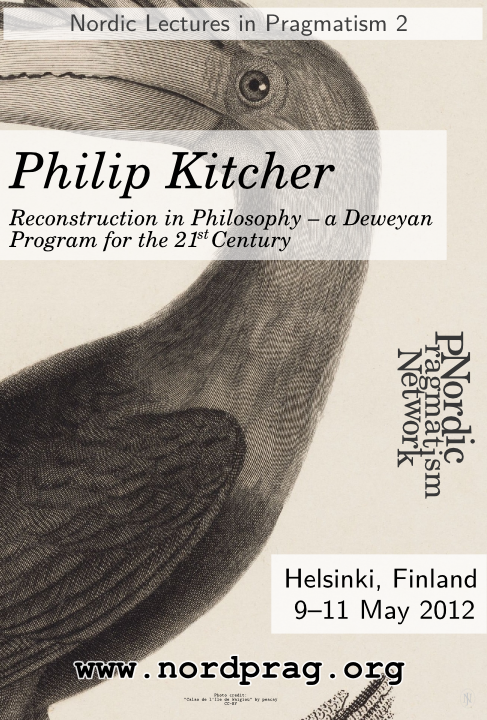A Deweyan Program for the Twenty-First Century
Nordic Lectures in Pragmatism 2
Helsinki, Finland, 9-11 May 2012
Description
Dewey offered a radical pragmatism, designed not only to offer alternative solutions to the problems addressed by his philosophical contemporaries, but to change the philosophical agenda. In his lectures, Philip Kitcher will review Dewey’s attempt to renew philosophy, and explore ways in which Dewey’s program might apply in the twenty-first century. He will take seriously Dewey’s conception of philosophical problems as arising in response to the evolving conditions of human life, and of philosophy’s role of synthetic critique. The lectures will range over topics in metaphysics, epistemology, ethics, social and political philosophy, and philosophy of religion. They will draw on Kitcher’s forthcoming collection of essays Preludes to Pragmatism(Oxford University Press, 2012) as well as on material from a book in progress.
Philip Kitcher, currently a Fellow at the Wissenschaftskolleg zu Berlin, is the John Dewey Professor of Philosophy at Columbia University. He is the author of books on the philosophy of science, on philosophy of mathematics and philosophy of biology, on science and social issues, and on ethics, as well as on Wagner’s Ring and Joyce’s Finnegans Wake. A former President of the American Philosophical Association (Pacific Division), he is a Fellow of the American Academy of Arts and Sciences. He was the first recipient of the Prometheus Prize, awarded by the American Philosophical Association for lifetime achievement in expanding the frontiers of philosophy and the sciences. His stay in Germany during the current academic year is partially supported by a Humboldt prize.
Enrolment and venue
Students from the University of Helsinki are required to enroll to the course using WebOodi. Other participants are required to enroll to the course by sending an email to info@nordprag.org by 1 May 2012.
The lectures take place as follows:
- Wednesday, 9 May, 10.00-11.30 and 14.30-16.00, University main building, Fabianinkatu 33, Room 7 (3rd floor)
- Thursday, 10 May, 10.00-11.30 and 14.30-16.00, University main building, Fabianinkatu 33, Room 8 (3rd floor)
- Friday, 11 May, 10.00-11.30 and 14.30-16.00, University main building, Fabianinkatu 33, Room 8 (3rd floor)
Students can complete the course by participating in a written exam (3 credits) and/or writing essays on themes given at the lectures. Essays should be ca. 8 or 12 pages long (for 2 and 3 credits, respectively, approximately 300 words / page). More information will be given during the lectures.
The course can be used for several study units in philosophy subjects at the University of Helsinki. For further information, please see the WebOodi registration page for the course.
Exam
The course exam will take place at University main building, room 16 (new side) on 23 May 2012 at 14.15-15.45 pm. The exam gives 3 credits, which can be supplemented by writing an essay for 2 credits to yield altogether 5 credits.
Essays
Students may supplement the exam by an essay for 2 credits or complete the course to receive 5 credits by writing two essays. Essays should be ca. 8 or 12 pages long (for 2 and 3 credits, respectively, approximately 300 words / page). Please send your essays to henrik.rydenfelt(at)helsinki.fi by 10 June 2012.
Each of the essays should use the lecture material to discuss one of the following claims (indicated by number):
1. Rorty was essentially right. When a Deweyan critique of traditional philosophy is taken seriously, philosophy comes to an end. As the further elaboration of Kitcher’s neo-pragmatism shows, what is supposed to “continue philosophy” is something entirely different.
2. An evolutionary / pragmatist account of ethics can make no sense of ethical truth.
3. An evolutionary / pragmatist account of ethics inevitably commits the fallacy of inferring values from facts.
4. The principal problems for epistemology, understood as aimed at advancing inquiry, center on the social processes of finding and transmitting new knowledge.
5. Pragmatism must reject the conception of truth as correspondence to reality.
6. Genuine democracy requires social solidarity, understood as a condition of recognizing and responding to the aspirations of others.
7. Free-market capitalism is a precondition for the realization of what Mill and Dewey view as the most fundamental form of freedom.
8. No “religion” that abandons belief in transcendent entities can discharge the functions traditional religions have fulfilled. Secular humanism is inevitably incomplete and unsatisfactory.
Materials
Lecture 1: Dewey’s Radical Vision
- Lecture slides (ppt)
Required reading:
- Philip Kitcher: “The Importance of Dewey for Philosophy” (pdf)
- Philip Kitcher: “Philosophy Inside Out” (pdf)
Recommended reading:
Lecture 2: The Centrality of Valuing
- Lecture slides (ppt)
Required reading:
- Philip Kitcher: “Precis of The Ethical Project” (pdf)
Recommended reading:
- Philip Kitcher: The Ethical Project (entire)
- John Dewey: Experience and Nature, ch. 10 (link)
- John Dewey & James H. Tufts: Ethics (2nd ed.), final section of Part II (link)
Lecture 3: Transforming Epistemology
- Lecture slides (ppt)
Required reading:
- Philip Kitcher: “Epistemology without History is Blind” (pdf)
- Philip Kitcher: “Pragmatism and Realism” (pdf)
Recommended reading:
- John Dewey: Experience and Nature, ch. 4 (link)
- John Dewey: The Quest for Certainty, chs. 4-5 (link)
Lecture 4: Challenges for Democracy
- Lecture slides (ppt)
Required reading:
- Philip Kitcher: Science in a Democratic Society, ch.3 (link)
Recommended reading:
- John Dewey: The Public and its Problems (entire) (link)
Lecture 5: Education under Constraint
- Lecture slides (ppt)
Required reading:
- Philip Kitcher: “Education, Democracy, and Capitalism” (pdf)
Recommended reading:
- John Dewey: Democracy and Education, chs. 1-9, 19, 24 (link)
Lecture 6: Secular Humanism
- Lecture slides (ppt)
Required reading:
- Philip Kitcher: “Challenges for Secularism” (pdf)
Recommended reading:
- John Dewey: A Common Faith (entire) (link)
